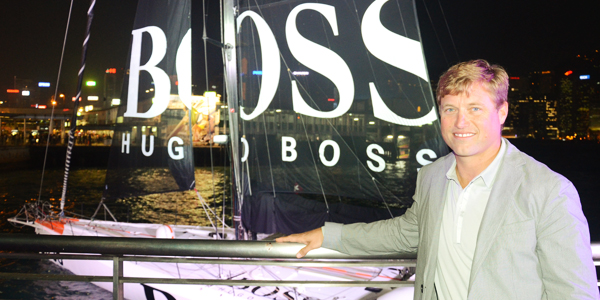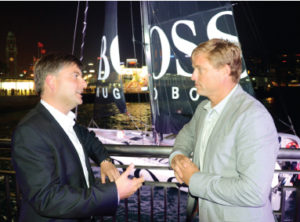

Challenges
With a yachting career that has been dealt its fair share of drama, we asked Thomson what was the most challenging moment he had endured on his travels. There were two events which came to mind, he said, firstly in 2006; racing solo halfway between Africa and Antarctica, the keel of his boat broke and it capsized. Fortunately, another sailor diverted his course to come to his aid. Thomson laments not so much missing out on the race but rather the loss of his boat with which he had accomplished many firsts in his sailing career and had had many great experiences: “It was like losing a good friend.”
Secondly, he recalled the Vendée globe race in 2008, a fishing boat crashed into his boat shortly before the race began. Despite the determination, effort and support of his crew and even other competitors to get the vessel sea-ready again, the damage dictated that the team had to retire from the race. Thomson asserted, “To do this type of job you need to be the sort of person that is focused and loves challenges and surprises—when you’ve decided to do arace you’re almost prepared to do and put up with anything to get there.” He credited the support of Hugo Boss and his on- and off-land ‘family’ with keeping him going, the responsibility they feel towards one another translating into an obligation not to let each other down.
Crew checklist


Thomson advises other leaders to identify their team’s skills and use them, "I am a sailor, but when I’m on the boat I’m a people manager first.” Some crew come onto the boat with little to no sailing experience, having paid for the opportunity. “It is important to realise that each and every one of them will have something valuable to bring to the table, whether it be looking after other crew or navigation.” The experienced skipper then reminisced about a time he was second guessed by a crew member with little more than basic training who had been on board for only five days, the junior suggested that the route Thomson had proposed was no good and that they should follow an alternative route. The junior was right, “It just goes to show, you should have open communication with your team to be able to use them to full advantage.”
Another vital part of leadership is coping with stress, as a leader you are responsible for managing the whole team and making sure everything goes to plan so you must be sure to keep control of on-board stress levels, “Not only your own but your team’s too.”
The biggest mistake Thomson feels leaders make is micromanaging, “You need to share the responsibility, let people make mistakes. Then you, as the leader, will have time to take a step back observe, consider strategy and truly lead.”




